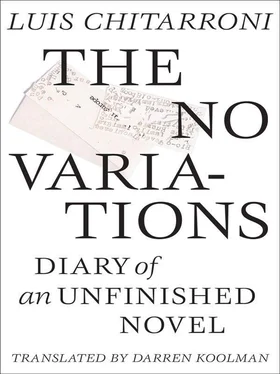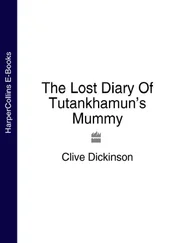The correspondence of mythological ambiguities (with additional ones taken from Sebastien Birt’s Diary to Elena ) in the latter: “my male sister,” etc. etc.
In contrast: the profusion of expletives in Eiralis’s letters, not solely attributable to the epistolary tone, and their scarcity verging on dryness (not solely to be blamed on ambiguity of phrasing) in Felipe Luini’s “The Office Next Door.”
At the height of their dalliances and defiances
Lalo and Remo began moving as one, intrigued by the delectable matter offered them by their master. They snuffled with equal misgiving, with the same animal mistrust. Then they submitted unanimously, obeyed. While Elena’s ability to respond to compliments, or pretend to respond, was strong, [well-known, profound, as her listlessness] her dry disinclination for returning them was characteristic: in the case of Lalo and Remo, a rejection of either one was to be taken as a rejection of both. A strange procedure indeed. She appreciated in [others and in] herself the capacity for contempt and invective, but not for passive flattery. For Lalo, her lack of response made her seem almost a widow, dead to love because of Urlihrt, because of condescending indifference. She, disposed [as was stated] to use up all her nine lives at once, was already familiar with those nuances of love as they are reckoned in the tribunal of a single glance.
#28
Basilio’s briefcase [Charles Bovary’s cap]
— Stop describing it, Basilio. I swear I didn’t see it.
Francisco Xavier Aldecoa Inauda (1569–1616). Aldecoa recounts: “I was born under the aegis of the twins, heralded by a pageantry of signs. The first born, having already deprived my mother of her prime, and fifteen years of working life, I would be the son that, after a difficult labor, deprived her of her life. The place of my birth was the village of Yeste, at the house of the Inaudi, the which being my grandparents’ home, in the distant far away, and I know not how my father came to traverse that distance for the conception. He was the court bailiff, and was never at home. That I grew up beset by poverty, but in the tender care of one of my mother’s sisters, was the will of the omnipotent and simpleminded Lord. In my works, by contrast, the reader will discover in the disarray that life is not disposed as verse or prose, and for a man to persist in trying to arrange it thus, makes him vain, obstinate, and deficient in skill, in reason, and in memory.” Those works include the sonnets and décimas from La semana horizontal , which was dedicated the duke of Osuna, and is often compared with the Devotions of Donne (1573–1631), since the Spaniard’s work was also the product of a lengthy convalescence; the comedy in verse, La ceñida visitada ; the long meditative work, Ejercicio malogrado en homenaje a la vista , which, between 1608 and 1611, was translated and exported all the way to America (where it was used by certain schools of thought for matutinal instruction), and sometimes known by the title Lengua de pájaros , after one of its longest chapters: it was his most frequently printed book. A victim of mild insanity — the Spirochaete way — Inauda inaugurated a mode of free expression that belongs more to the twentieth century, which is the reason why he’s been variously celebrated as a precursor. Much of Inauda’s oeuvre remains secreted and unpublished by his estate, which is kept by a fanatically religious descendant who prevents “their being known to a wider public, which is neither here nor there, since the works themselves aren’t aware of being read, or that they risk my soul’s place by the side of the righteous.”
Eloy Armesto made his critical debut for Hendiadys and was afterwards encouraged to write for less boring journals by Cristóbal Niaris and, above all, Annick Bérrichon. Author of valuable works of fiction: ( The Prince of Modesty, Tatami, Sensei, Progress [[Vienna while in Prague]] ) (novels). Pretérito anterior (Past Perfect) collects all his critical works to date.
The Meaulnes, Edgar Alain: the journal’s first exegete and faithful apologist. Berna, while in Riga.
Biruté Aurigón: the first lady to penetrate the virile cloister of Agraphia —patterned after a confessional — was this Cuban exile living in Buenos Aires. She was married to Virgilio Anscombe Melián, who held a diplomatic post at the (…) embassy. In the early fifties she was officially Urlihrt’s lover. All her books, which anticipate magic realism, merit republication. They are: Sepúlveda and us, The Tales of Jeremiah (children’s), The Dazzling Kingdom, The Bone and the Salt, She Recovered at Home (Casa de las Américas Prize), Beyond Them were All, The Fruit of Yesterdays, Spring of Ashes, The Statuette Prince (children’s), Migraines and other Private Weaknesses, George Gershwin (illustrated biography).
Zi Benno: nom de plume of the author of a gigantic work entitled, The Epsilom (or My Scruples) , a cycle of almost four hundred novels (among them, The Surface of Venus, The Sirius Point of View, The Anecdotal Father, The Times, A Small Wonder, The Spartan Minutes, The Ionian Spy, The Gay Physicist, For a Terrible Theatre, Without Sensing that they Call Me, The Chance Encounter of V[irgilio] P[iñera] and T[ennessee] W[illiams] at the Poolside Surrounded by Guests, The Ankles of Memory, Mexican Journal, High Jump, Embroidered with Cadmium Thread, Mortuga, The Snail, The Winding, By the Grace of Terence, Fossil Chamber, The Unfortunate, An Adaptation, The Patrol, Ghetto Bosses, Age of Fractals, The Intellectual Hoard, In Search of Madame Tussaud, Tabitha Salieri, The Bearcat’s Search, The Mongoose’s Pagoda, Titanium Thigh , etc.)
Shortly after his death (September 11, 2003), when the identity of this prolific and well-regarded (though still poor) writer was revealed, those who didn’t know the man by his real name — a few close friends — were astonished: César Quaglia.
Constantin Beret (1899–1966). “For all exiled Russian writers, the German word Zeitgeist is a fairy with no counterpart,” wrote Beret, christened Constantin by his fantasist mother, who was an admirer of his homonymous precursor, Balmont. He even wrote a work in Russian, French, and English in which he homelized on this maxim throughout, although it had failed to conquer his imagination, an environment inimical to fairies. He dedicated himself to showcasing his style, which tended more to the playful and suggestive than the polemical and invective, in his first collection of short stories, Broken Mirror (from which “Semblance” is taken), which remains the best place to encounter at once his elusive heroines, his borrowed moneylenders, his transgressions, and predictable use of candelabra. He also wrote a tedious biography of Lermontov (translated into Spanish with the title, El héroe sin tiempo ), which cemented his reputation in France. The translation of “Semblance” was attributed to Belasario Tregua, with multiple emendations by Urlihrt, Luini, and someone else. Of Beret’s many works, the Agraphia committee used always to recommend three titles: Rhapsody in Pink, Symmetry and the Diabologhs, Hotel Abîme .
Annick Bérrichon (1888–2000)
Eloísa Betelgeuse (1950–1979) a.k.a . Eliza Beetlejuice ( née Consuelo Inés Maspero), author of The Chysalid Initiation, Perspective in Botteghe, Catalogue of the Annunciation . Committed suicide on November 22, 1974, in Buenos Aires. Publication in French [?] and English earned her a universal reputation for … A sequence of posthumous poems, edited and published in 1980 with the title, Gris gris. Tango Elegies . The author of this note first encountered her famous sestina in 1997, and it was [almost immediately] translated into French by … Bettina Agutter.
Читать дальше












